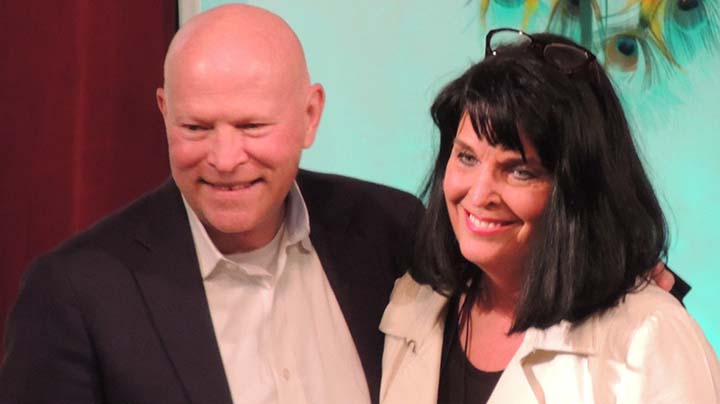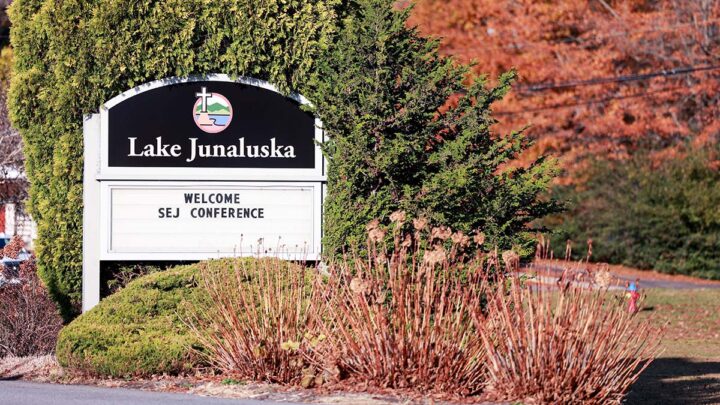By Aimee Yeager (Western North Carolina Conference) & Jessica Brodie (South Carolina)

On Wednesday evening, as delegates returned to Stuart Auditorium for the day’s final business session, the white lights strung around a giant Christmas tree could be seen across the lake, the reflection shimmering in the water. An usher, in high spirits, called out in a sing-song voice, “Calling all delegates! Let’s elect some bishops!”
SEJ elected Dr. Connie Shelton as its second bishop late Wednesday, ending a day filled with 12 ballots, passage of a $1.5 million jurisdictional budget, committee reports and a bit of contention over whether or not to consider three resolutions.
Wednesday’s evening session, presided over by Bishop Leonard Fairley, brought ballots 8 through 12 and Shelton’s election just before the session ended.
“There are no words,” a tearful but grinning Shelton told the body. “I will serve you with my whole heart, I will love God and love you, and we will remember what is said at our baptisms:
You are initiated into Christ’s holy church; we are incorporated into God’s mighty acts of salvation.
“SEJ, let’s not give up on one another. God is inviting into this new day. May God give us open hearts, open minds and open doors.”
Besides Shelton, the Rev. Edith Gleaves and the Rev. Ken Nelson were the top vote-getters on each of these ballots. Ballot 13 will begin Thursday morning.
Three resolutions go before body
While the SEJ’s newly-created Agenda Committee received and reviewed three resolutions brought before the conference, Del Holley reported the committee recommended these resolutions not be considered by the body. Holley said all three violate a jurisdiction rule or process or exceeded the authority set forth by Para. 27 of the Book of Discipline.
All three of the resolutions were presented by a progressive arm of the delegations seeking to move The United Methodist Church towards full inclusion of persons in the LGBTQ community.
“As a result of our deliberation, we are not recommending the resolutions be distributed to delegates, published in the (Daily Christian Advocate) or placed on the agenda for consideration,” Holley said.
However, the committee’s recommendation met objection, and the body ultimately voted 222-128 to appeal their decision and allow the resolutions to go before them and be voted upon Thursday.
Helen Ryde, lay delegate in the Western North Carolina Conference, was one of two who spoke urging the body to appeal the committee’s decision. She said they are being presented at all the other jurisdictional conferences.
“To not allow us to vote on these resolutions would silence the voices of all these delegates in the Southeastern Jurisdiction,” Ryde said.
Carlene Johnson, lay delegate from the Florida Conference, asked for an appeal of the committee recommendation. The body heard one speaker for this motion and one against.
Bishop Fairley first called for a vote on the request to appeal, which ultimately passed. Paper copies of the resolutions were distributed to the delegates, who were asked to consider the resolutions overnight. The resolutions will be heard and discussed during Thursday morning’s business session.
Building Toward the Future
The Rev. Lisa Yebuah—a younger pastor who is also a delegate from the North Carolina Conference—led a panel discussion with young adults on the future. Referencing the Bible’s older prophet Eli who worked with the younger prophet, Samuel, Yebuah said she is beginning to enter am “Eli stage,” and she finds it valuable to stay in dialogue with the “Samuels” who can help her see where she might grow.
The “Samuels” joining her onstage included the Rev. Darryl Dayson, a pastor in the WNC Conference; Bethany Harting, a third-year medical student from the Kentucky Conference; Maggie Taylor, who is part of a church staff in the Tennessee-Western Kentucky Conference; and Sam England of the Holston Conference, who is in law school and pursuing a doctorate in political science.
Each offered a word to describe the current reality in the church, with Dayson offering “pivotal” (as in, an opportunity to transform and pivot), Harting offering “heavy” (the weight of the emotional work being done), Taylor offering “strategic” (the opportunity to assess and use the creative minds God has given all) and England offered “normal time.”
As England elaborated, “Not to diminish what we’re doing, but it is normal in the history of the United Methodist Church and in the church in general. Things have been in flux; change has happened.
“At times we can be myopic and fail to situate our present in the church’s history, and I think that’s to our disadvantage.”
Taylor said the well-being of clergy and laypeople is a difficult aspect of the present.
“We are wearing people down slowly and surely to where the church is no longer a place of respite or hope, and we’re not caring for people in a way that is healthy,” she said.
Also, as a people, we have a deep desire to control each other, which doesn’t work well.
“God does not have a box,” Taylor said.
Dayson said he’s been diving deeper into prayer right now, not only alone but in tandem with others and being truly vulnerable as he shares what breaks his heart and hears what breaks theirs.
Harting said one problem is the polarization in today’s culture.
“Sometimes we miss that we all are made in the image of God,” she said. “We need to embrace each other and remember we are ultimately working for the same God.”
As for what gives them hope, Dayson said it is his annual conference, Taylor said it is the local church and England said it is working with children and youth, something England does each summer. “Out of the mouth of babes who are anything but incompatible comes prophesy, words that can take us beyond anything we can dare imagine,” England said.
“The best days of The United Methodist Church are not behind us,” said Bishop Fairley, “they are in front of us. I hope that each of you deep down in your spirits were able to feel the hope.”
###

